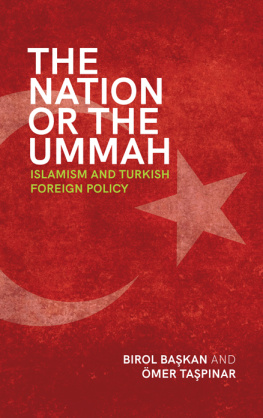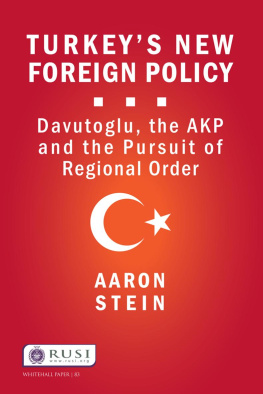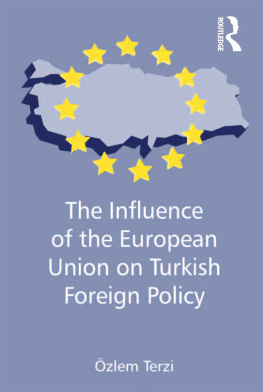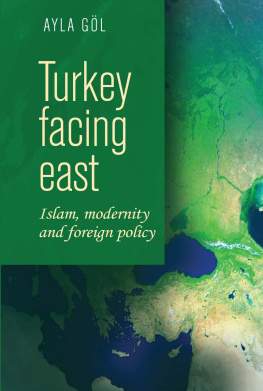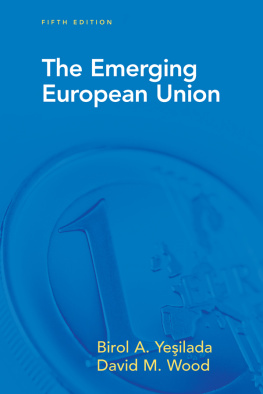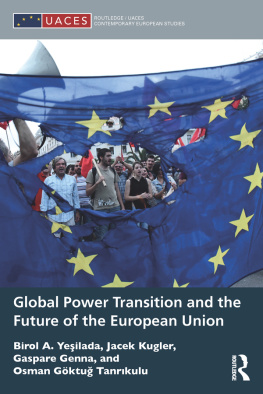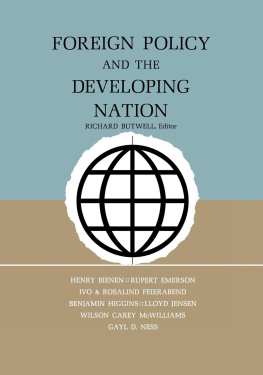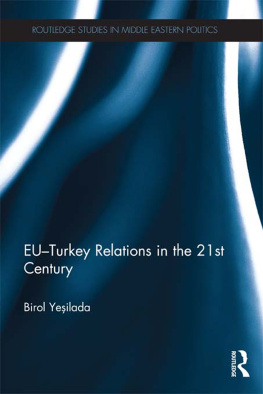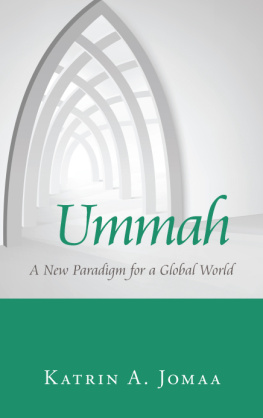THE NATION
OR THE UMMAH
THE NATION
OR THE UMMAH
ISLAMISM AND TURKISH FOREIGN POLICY
BIROL BAKAN AND
MER TAPINAR
Published by State University of New York Press, Albany
2021 State University of New York
All rights reserved
Printed in the United States of America
No part of this book may be used or reproduced in any manner whatsoever without written permission. No part of this book may be stored in a retrieval system or transmitted in any form or by any means including electronic, electrostatic, magnetic tape, mechanical, photocopying, recording, or otherwise without the prior permission in writing of the publisher.
For information, contact State University of New York Press, Albany, NY
www.sunypress.edu
Library of Congress Cataloging-in-Publication Data
Names: Bakan, Birol, author | Tapnar, mer, author.
Title: The nation or the Ummah / by Birol Bakan and mer Tapnar.
Description: Albany : State University of New York Press, [2021] | Includes bibliographical references and index.
Identifiers: ISBN 9781438486475 (hardcover : alk. paper) | ISBN 9781438486499 (ebook)
Further information is available at the Library of Congress.
10 9 8 7 6 5 4 3 2 1
to our moms,
Nezaket Bakan and Nuran Tapnar
CONTENTS
ACKNOWLEDGMENTS
Books are sometimes born in coffee houses. The idea of undertaking a collaborative project was born in numerous conversations we had at Saxbys Georgetown in the fall of 2019. The topic just came out naturally as we tried to understand how we, citizens of Turkey, reached a deep sense of malaise in both domestic and foreign affairs. Our conversations often reached the same conclusion: the Arab Spring repeatedly appeared as a truly watershed event, a real turning point not just for the Middle East but also for Turkey. And not just for Turkish foreign policy but also for the domestic predicament. This is how we embarked on the intellectual journey ending with this book. In many ways, more than a book, this was also a quest to understand our own fate.
From the beginning to the end we were fortunate to have the moral and intellectual support of Feyza Gmlolu and Gnl Tol, without whom this book would not come to fruition. We were also fortunate to receive academic and intellectual support from a number of friends and colleagues. We would like to cite in particular Adam Oler, Afyare Elmi, Burak Bilgehan zpek, Blent Aras, Cengiz andar, Doan Grpnar, Gencer zcan, Karim Sadjadpour, Mark Farha, Paul Salem, Philip Gordon, Suat Knklolu, Yaar Yak, and Yusuf el erif.
We thank Uluslararas likiler dergisi and Routledge Taylor and Francis Group for allowing us to reprint certain parts of our earlier publications: Birol Bakan, Turkey between Qatar and Saudi Arabia: Changing Regional and Bilateral Relations, Uluslararas Iliskiler 16, no. 62 (2019): 8599; Birol Bakan, Islamism and Turkeys Foreign Policy during the Arab Spring, in Islamism, Populism and Turkish Foreign Policy, ed. Burak Bilgehan zpek and Bill Park (New York: Routledge, 2019); mer Tapnar, Kurdish Nationalism and Political Islam in Turkey: Kemalist Identity in Transition (New York: Routledge, 2005).
And finally, we are grateful to Michael Rinella, his editorial team, and two anonymous reviewers at State University of New York Press for their interest, encouragement, suggestions, and criticisms.
INTRODUCTION
I want to give a very sincere advice, a very genuine warning to Egypts President Mr. Hosni Mubarak; listen to the peoples callings and their most humane demands. Respond without any hesitation to the desire of change coming from the people Freedoms cannot be delayed and ignored in todays world.
Recep Tayyip Erdoan, Turkeys Then Prime Minister, February 1, 2011
Turkey enthusiastically welcomed the Arab Spring even though this watershed event targeted those very regimes with which it had built cordial relations. Ankara eagerly developed strong relations with the postArab Spring regimes that came to power in Tunisia, Egypt, and Libya, helping them diplomatically, financially, and even in the latter case militarily so that they could stay in power. Turkeys support to the anti-regime forces in Syria went beyond mere diplomacy and came to include logistics, finance, and weapons.
Turkey paid a heavy price for its stance. A military coup in Egypt overthrew the new regime Ankara had diplomatically and economically supported. Under the leadership of Recep Tayyip Erdoan, the Turkish government reacted so harshly to the coup that a total collapse in its diplomatic relations with this most populous Arab country became inevitable. And by supporting the anti-regime forces in Syria, Turkey directly contributed to this countrys plunge into a bloody civil war and as a result came to bear the brunt of the ensuing massive refuge crisis.
This warm embrace of the Arab Spring clearly put at risk Ankaras interests with the prostatus quo powers of the region, namely Saudi Arabia and the United Arab Emirates, the two Arab countries that had always been Turkeys largest trading partners in the Middle East. Turkeys actions and reactions during the Arab Spring eventually led to its isolation and badly tarnished its image in the region.
Why did Turkey embrace the Arab Spring with such hubris? This book seeks to explain the logic behind Turkish foreign policy during and after the Arab Spring to shed light on what constituted a sea change in Ankaras traditional approach toward the region. In an attempt to see the connections between domestic political change and foreign policy reformulation, the study closely examines how Turkeys internal evolution under the ruling Adalet ve Kalknma Partisi (Justice and Development Partythe JDP) impacted its strategic logic during this tumultuous era. The core assertion of our study is that Islamism as both ideology and vision goes a long way in explaining the prism through which the JDP approached the Arab Spring and implemented its strategy. As the analysis will illustrate, such an ideological approach constitutes a sharp departure from the conventional foreign policy ideology of Turkey known as Kemalismnamed after the founding father of the republic Mustafa Kemal Atatrk.
This rather radical shift from Kemalism to Islamism has not been sudden. It took almost a decade for the JDP to consolidate its political power at home. Only after he subdued political resistance and monopolized decision making, the countrys hegemonic leader, then Prime Minister, now President Erdoan, ventured into an Islamist direction in his foreign policy. Even then, it remains questionable if such a turn would have been feasible without exceptionally tempting regional opportunities, such as the collapse of the deeply entrenched political autocratic systems in Tunisia, Egypt and Libya. In that sense, the domestic political context of Turkey and the regional context of the Middle East had to serendipitously converge for an Islamist foreign policy to emerge.
When the regional upheaval began, JDPs reemerging Islamist ideology quickly adopted a theory that saw what was happening in the region in line with its assumptions, ideals, vision, and expectations. According to this ideological interpretation, the Arab Spring was a unique historic opportunity that was sweeping away the culturally alienated ruling establishments in the Arab world and bringing to power the true voice of the people, the Islamists. Acting on such an ideological interpretation of the events, foreign policy makers in Ankara welcomed the Arab Spring with the calculation that Turkey could better work with the new postArab Spring regimes in the Middle East and thus improve its own sphere influence in the region and standing in the world.


